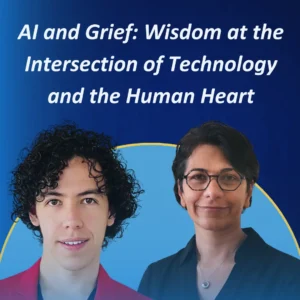AI and Faith has compiled resources from our AI and Grief theme, from May/June 2025.
Podcasts
In this conversation with Nikki Mirghafori, we explore how artificial intelligence intersects with emotional suffering. How might technology help us understand, alleviate, or even exacerbate our inner struggles? Drawing on her dual background in AI and Buddhist contemplative practices, Nikki offers insights into the role of wisdom, compassion, and awareness in a rapidly digitising world.
AI is being integrated into every element of our world and the human experience. Mourning and death are no exception. From grief bots, to AI ghosts, to robot pet companions, artificial intelligence is beginning to be woven into some of the most personal, difficult, and transformational moments of our lives. In this episode, Gilad Berenstein, Muhammad Aurangzeb Ahmad and Nathan Mladin explore that intersection.
In an interview with AI and Faith expert Thomas Arnold, we’ll talk about how AI is affecting our relationship with death, and with our loved ones who have passed away. We’ll delve into how our grieving process is changing, and how that affects what, until today, seemed like a normal, if difficult, part of our lives.
AI&Faith Articles
LLMs are now available through applications such as Therabot and Mindspa, and are marketed to assist with mental health counseling. How should consumers and mental health professionals engage with these tools, and what principles should guide AI developers in their design? In this touching and thought-provoking piece, Lino Ramirez shares his own experience and offers five guidelines for better designing LLMs to aid mental health professionals.
Grief is a deeply human experience, and no technology can replace the comfort of presence, empathy, and faith. In this heartfelt reflection, AI&F advisor Derek C. Schuurman recounts his personal journey through loss, examining the rise of AI tools like “griefbots” and therapy chatbots—and why they ultimately fall short. Read how authentic connection and hope offer a far deeper comfort than any digital simulation ever could.
Griefbots, or large language models fine-tuned on the writings of a deceased loved one, are quickly gaining popularity as a tool to aid family members in processing grief and celebrating the life of the deceased. Yet, these models pose important spiritual and ethical challenges. In this piece, AI&F expert David Zvi Kalman explores how these models ought to be ethically trained and deployed.
Outside Articles
In this recent post from 3 Quarks Daily, AI and Faith expert Muhammad Aurangzeb Ahmad, well known for his research on grief tech, explores the ethical dilemmas posed by using LLMs to “restore” lost memories of loved ones. Is this a matter of preserving or fabricating a memory? Where do we draw the line between therapeutic narrative and harmful delusions?
How AI could assist when patients lack advance directives? What are the ethical limitations of AI in healthcare, especially surrounding issues like outdated data reflecting past beliefs, biases against minority groups, and the lack of transparency in AI decision-making processes? In the article “Should AI Speak for the Dying?” by AI&F Expert Muhammad Aurangzeb Ahmad explores the potential role of AI as a surrogate decision-maker in end-of-life medical scenarios.






